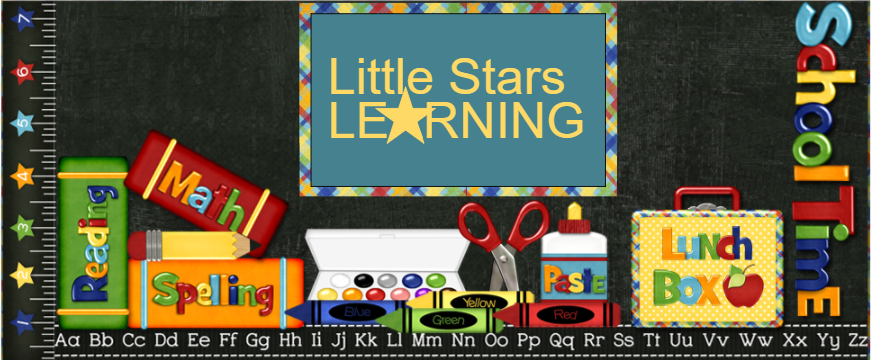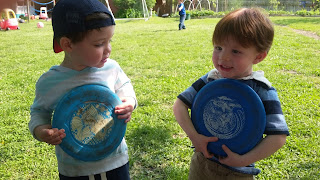The concept of possession is one of the most important for children to attain. Our society is based upon respect for our and other's possession of material goods, rights, responsibilities, feelings, etc.
We begin from birth to give them claim to their feelings. "Does your tummy hurt?" "Oh, you're hungry." "Such a sad face."
By a year, we are stating claim to others' possession. "He's sad that you hit him." "Those are mommy's, no touch." "Not yours, give back."
In general, toddler rules of possession go like this:
- Constant reinforcement of what is theirs
- Expectation of understanding and respecting their own possession of feelings, material items, responsibilities
- Expectation of them respecting others' possession of feelings, material items, responsibilities
The toddlers are now 22 months old, and are getting down the concept of one another's possession of material things. We begin to work on this area of the concept as soon as they can begin to reach for things they want, around 6 months old. By 12 months, we are telling them things like, "No touch," "Not yours," "Let go," "Give back," and of course, "MINE."
A key moment happened for us last week when two of the toddler boys were both using similarly colored Frisbees. In the past, as in up to a couple days prior, they would basically take whichever Frisbee they came across first, whether or not it was "their" Frisbee. If the other child had laid claim to it for a while and viewed possession, then a fight would ensue. This time, though, as soon as one of them noticed the Frisbee was not "theirs," the child would immediately head off to find the one they were using. A few times, a child would point out the other child's Frisbee to that child. Possession is one thing, RESPECT for other's possession, is at a whole different level of cognitive and emotional development.
The fact that the Frisbees were so close in appearance [to a toddler] was an indication of just how much the concept had sunk in for them, along with a significant increase in observational skills and discrimination skills.
They have now also assigned possession between them to other toys here at school, such as particular cars, push toys, t-ball bats, etc. and will pass over other's to get to "their" toy, or purposefully hand over the toy to the other child, often whether the other child really wants it at that moment or not.
It helps that each child has a specific color for their dining ware, a specific spot for nap, a sleeping bag that is uniquely colored, a specific spot at the table, a cubby they can reach to keep their stuff separate, etc. By having these solid foundations for what is MINE at school, it gives them a daily grounding in possession from a very early age.
I do not force sharing. I have other blog posts with links to people with more expertise than I have to tell you why. Many child care/preschool settings do not allow personal items from home. I ENCOURAGE it. The children do NOT have to share their items from home. Why?
To teach respect and the concept of possession.
Theirs is theirs, not yours.
A child may ASK if the owner will nicely share, but they do not have to share. The child needs to RESPECT that it is the owner's toy. If the owner is nice enough to share, then the child needs to treat the toy kindly and give it back, directly to the owner, when through.
Respect for possessions is not just for other people's. The children who bring items from home must keep them in hand [or on their face/head/etc.], in their cubby, or in a safe spot.
 |
| Even at nap we respect their possession. |
I received a text from Mr. R's mom this weekend asking if I made the toddlers claim their messes. He was spilling water, pointing, and saying, "Mine!"
I responded that yes, I do, and I expect them to clean it up as well. Possession and responsibility have many facets, and this is just another one of those.
The concept of possession and respect for possession is just SO important and it amazes me that this is not an actively TAUGHT concept. All children get it, but through passive, normal interactions. I purposefully place children into situations where this concept can be absorbed, developed, reinforced, and practiced. I believe it makes for much more respectful and responsible children, at a much earlier age.
If a child takes something that isn't theirs, breaks something on purpose or through gross neglect, or is disrespectful of other's feelings/possessions/rights, then there needs to be consequences beyond saying, "I'm sorry." "Sorry," doesn't make anything better and it doesn't change behavior or their moral/ethical compass. Reparation and consequences that are directly in line with the disrespect are appropriate, and DO make a difference.
Eventually.
We hope.
I'm not sure even adults can ever perfect this concept, but we try.

















No comments:
Post a Comment
Note: Only a member of this blog may post a comment.